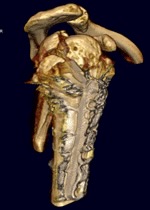 The hardware in my shoulder is now old enough to vote.
The hardware in my shoulder is now old enough to vote.
What was to have been a short bicycle ride turned into a year long rehab project. We were “training†for a cycling tour of Ireland to celebrate my wife’s 50th birthday. We were learning how to use cycling shoes locked into the pedals and had been told to expect some falls as we got used to the new equipment. My first, and last, fall occurred 250 feet from our house. After a trip to the emergency room, initial X-rays, a sling, a long weekend waiting to talk to my doctor, a visit with my newest orthopedic surgeon, an MRI, and still more X-rays we had a correct diagnosis. I had a “closed, comminuted, fracture of the right proximal humerusâ€. In lay terms, I had transformed my right shoulder into a jigsaw puzzle that now needed assembling.
One bit of good fortune was that I am left-handed. The other piece of good fortune was that the surgeon was able to repair the damage with a steel plate and a distressing number of long screws that put all the pieces back into proper alignment.
After the surgery, it took nearly a year of physical therapy to get back to about 90-95% of full range of motion and function. I’ve had enough encounters with orthopedic surgeons and physical therapists over the years that I understood that you need to be diligent about putting in the work if you want to get the results.
Physical therapy is one of those areas where you can effectively monitor and measure progress. And where the entire system supports the connection between effort and results. I’ve become skeptical about the apparent simplicity of this equation. We like to pretend that this connection between effort and results is universally true. Do the work, get the results. How do we tell that we’re in a setting where the equation breaks down? Where do we learn to see situations where we’re better served by taking a broader look? Can we do less work and get the same result? Better results? Different results we hadn’t even thought to ask for? Some people seem to have a talent for looking at existing systems and seeing new options. Is that a special talent or is it a perspective that can be developed?
The obvious answer is that this is the realm of innovation. And it is a realm that has attracted considerable study. But even here, we seem to want to celebrate effort. We’re very suspicious when someone tells us we’re working too hard. I’d be happy to get better at seeing times when I’m working harder than I need to. And learning to ignore the judgmental glances that hint that I’m not putting in the effort they deem suitable.
I want to get better at doing the work when the work matters. And not doing the work when it doesn’t.